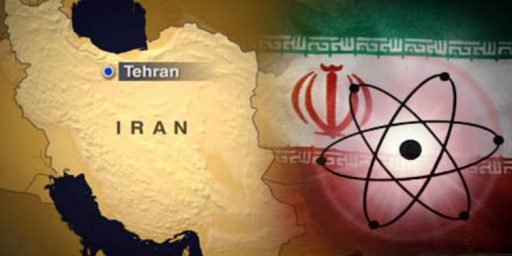Iraq and Afghanistan Winnable Wars
 Anthony Cordesman, a longtime Iraq War skeptic and administration critic, argued in yesterday’s Washington Post that the wars in Afghanistan and Iraq are “winnable.” It’s a tightly written piece that defies excerpting but here is the crux of it:
Anthony Cordesman, a longtime Iraq War skeptic and administration critic, argued in yesterday’s Washington Post that the wars in Afghanistan and Iraq are “winnable.” It’s a tightly written piece that defies excerpting but here is the crux of it:
No one can return from the battlefields in Iraq and Afghanistan, as I recently did, without believing that these are wars that can still be won. They are also clearly wars that can still be lost, but visits to the battlefield show that these conflicts are very different from the wars being described in American political campaigns and most of the debates outside the United States.
[…]
What the situations in Iraq and Afghanistan have in common is that it will take a major and consistent U.S. effort throughout the next administration at least to win either war. Any American political debate that ignores or denies the fact that these are long wars is dishonest and will ensure defeat. There are good reasons that the briefing slides in U.S. military and aid presentations for both battlefields don’t end in 2008 or with some aid compact that expires in 2009. They go well beyond 2012 and often to 2020.
If the next president, Congress and the American people cannot face this reality, we will lose. Years of false promises about the speed with which we can create effective army, police and criminal justice capabilities in Iraq and Afghanistan cannot disguise the fact that mature, effective local forces and structures will not be available until 2012 and probably well beyond. This does not mean that U.S. and allied force levels cannot be cut over time, but a serious military and advisory presence will probably be needed for at least that long, and rushed reductions in forces or providing inadequate forces will lead to a collapse at the military level.
The most serious problems, however, are governance and development. Both countries face critical internal divisions and levels of poverty and unemployment that will require patience. These troubles can be worked out, but only over a period of years. Both central governments are corrupt and ineffective, and they cannot bring development and services without years of additional aid at far higher levels than the Bush administration now budgets. Blaming weak governments or trying to rush them into effective action by threatening to leave will undercut them long before they are strong enough to act.
Any American political leader who cannot face these realities, now or in the future, will ensure defeat in both Iraq and Afghanistan. Any Congress that insists on instant victory or success will do the same. We either need long-term commitments, effective long-term resources and strategic patience — or we do not need enemies. We will defeat ourselves.
Donald Douglas praises Cordesman as “scrupulous in his even-handedness” and Dave Schuler judges him “consistently a purveyor of sound advice on Iraq and Afghanistan,” assessments which I share. But Kevin Hayden says Cordesman is part of the “false promises” gang, noting that Cordesman called for just “one more year in Iraq” a mere four months ago.
Perhaps that’s because Cordesman reflects the sober judgment of the foreign policy community. Here’s his conclusion in that piece from last October:
The odds of success are less than even. But it’s worth a try because the stakes are immense. America’s reputation and credibility are at risk; it “broke” Iraq, put 28 million lives at risk and is morally responsible for the consequences. Global energy security — the continued flow of the oil exports that fuel the world’s economy — are also in play. We shouldn’t stay in a losing game indefinitely. I believe we should give ourselves until October 2008; if there’s no Iraqi political accommodation by then, we should get out.
Meanwhile, we must play out the hand we have dealt ourselves.
Is he already hedging his bits on the goalposts for withdrawal? So it would seem. But the underlying calculus remains the same: The odds of success aren’t as one would like but the cost of failure is high. So long as the casualties are low and there are hopeful signs, then, we may well continue to muddle through with calls for “another year” or, as anti-war wags would have it, two more Friedmans.
There’s not much question that Congress will continue to insist on instant victory and administrations will continue to blame weak governments. The question is whether we’ll continue muddling through, extending the operations a few months at a time, long enough to succeed.
I don’t have the answer to that. It’s slightly more likely to happen under a McCain administration than an Obama or Clinton administration — but only slightly. McCain would be a more reliable champion of the wars, especially the one in Iraq, but Obama and Clinton would have an easier time persuading what is almost certain to be a Democratic Congress.




When these people speak of “victory”, what precisely do they mean?
I’m getting the impression that the goal posts for “victory” have gotten so out-of-whack that now a permanent military presence in Iraq to sustain a fractured and ineffectual government, combined with lowered American casualties and continued occasional suicide bombings would be considered a “victory” by many.
I’m having a hard time being enthusiastic about this “victory”.
This returns us to the problem of metrics, whether for victory or defeat. On the one hand expecting a perfect political in Iraq seems unreasonable while on the other the glacial pace of political progress in Iraq is intolerable as well.
As long as progress is being made towards Iraqis resolving their political problems it certainly seems prudent to have forces there sufficient to provide some reasonable level of security but there’s the danger of a sort of Zeno’s Paradox of Achilles and the Tortoise in which progress is made but a resolution is never achieved.
I continue to believe that our policy in Iraq is one about which reasonable people can differ. Neither “side” is either all right or all wrong and we must form our policy by the messy, imperfect realities at hand which is what I see Dr. Cordesman urging us to do.
James,
But the question remains- win what? What will victory look like? Will America be stronger or weaker?
No one doubts that American troops will remain undefeated, that Al Qaeda affiliates, who were not there before we invaded, are finding it harder and harder to hit their targets, that eventually, at some unspecified time, Iraqi politicians may start seriously working to right their country, and save their people from further slaughter (If they’re not prepared to take those steps themselves, why in the name of God should we?). But what does America get out of this other than mounting deaths and growing numbers of wounded and maimed?
The cost of these two wars may not bankrupt the country, but already leading economists and investors are predicting the twenty first century will belong to Asia, and to China in particular (and, boy, won’t the Europeans have something to complain about then).
Mr Cordesman address none of this in his article, and does nothing more than repeat the usual administration talking points.
I don’t know if he’s hedging his ‘bits’ on the goalposts of withdrawal, but he certainly seems to be talking through them.
I’ve known Cordesman’s work for many years; his person for fewer. He’s just about the last person I’d see as ‘repeating administration talking points’. His analyses are his own and they are consistent. They are also very, very good.
What the US could get out of a stabilized Iraq is what the Bush Administration expected to get out of it.
A functioning, democratic government that would serve as an example for the region as to what is possible. It would also get a country, no longer hostile to its neighbors. That eases concerns (and prices) for oil, but it also lowers tension levels. That, in turn, means fewer US military and monetary assets would be required for the region as a whole. I like all of those things as an American. Oddly enough, most Arabs would like them, too.
To John Burgess’s comment I would add that the question is less what victory will look like but whether we’re more able to accept the costs of victory or the consequences of defeat.
Why do we continually lump these two wars together. Afghanistan was as morally correct, strategically and tactically brilliant as the war in Iraq was stupid. Afghanistan was all about the terrorists that attacked American soil; Iraq had NOTHING to do with terrorism, it was just a neo-con wet dream. If we had put as much effort into Afghanistan as we wasted in Iraq we may have even caught OBL by now. How about we talk about getting out of Iraq so we can finish in Afghanistan?
We lump Iraq and Afghanistan together because, regardless of the reasons we invaded either, withdrawing from either will have consequences.
You also might want to check out the logistics of a force the size of the one we have in Iraq in Afghanistan.
Staying in both also has consequences.
True. If it had been left up to me, we wouldn’t have invaded Iraq. But that ship has sailed.
This is not a convincing argument. Withdrawing our troops from Kosovo and removing our troops from Korea would each also have consequences yet we don’t lump those together.
They are lumped together to add legitimacy to Iraq by tying it to the legitimate invasion of Afghanistan and to diminish criticism of Iraq policy by linking it to Afghanistan.